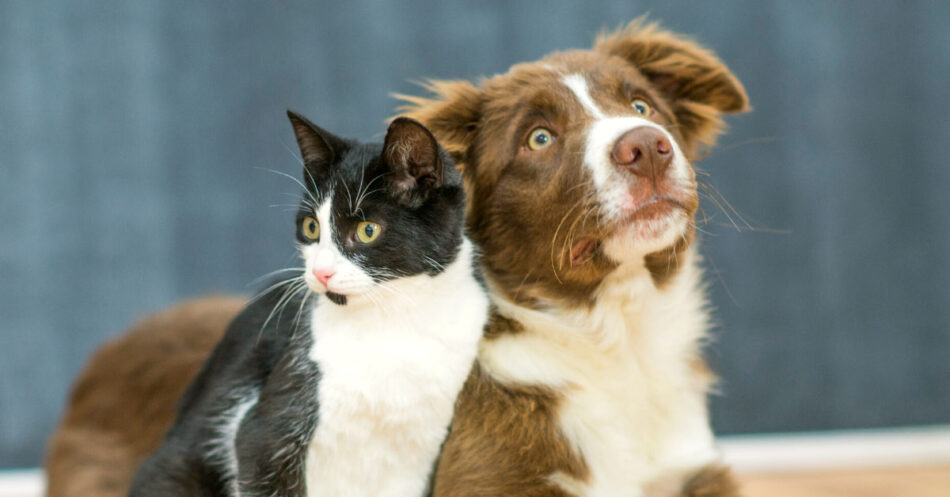
An Honest Review of Zylkene for Managing Dog and Cat Anxiety
Is Zylkene good for dog and cat anxiety?

Pet Living editors select and review products independently. If you purchase through affiliate links, we may earn commissions, which help support our testing. Read more.
I talk a lot on my blog about dog and cat anxiety. And with good reason. I’ve had two dogs with severe cases of anxiety.
Buck had separation anxiety that was so extreme that if I wanted to leave the house, I had to put my car in neutral and roll out of the garage so he wouldn’t hear me leave. And my dog, Chilly, had extreme noise anxiety—not an ideal situation in Florida, where thunder is a near-daily occurrence for many months of the year.
So, all this to say, the topic of pet anxiety is one that is near and dear to my heart, and the reason I created Pet Anxiety Awareness Month. I’m committed to helping pet parents find working solutions to their pets’ anxiety since it has such a profound effect on their quality of life.
Zylkene has been around for some time, and I’m often asked if it actually works to manage dog and cat anxiety. The short answer is yes! It can help. But what works for one cat or dog may not work for another. And I almost always recommend using a layered approach to manage your pet’s anxiety.
If you’ve got an itch to learn more about Zylkene for your pet’s anxiety, let’s get into it!
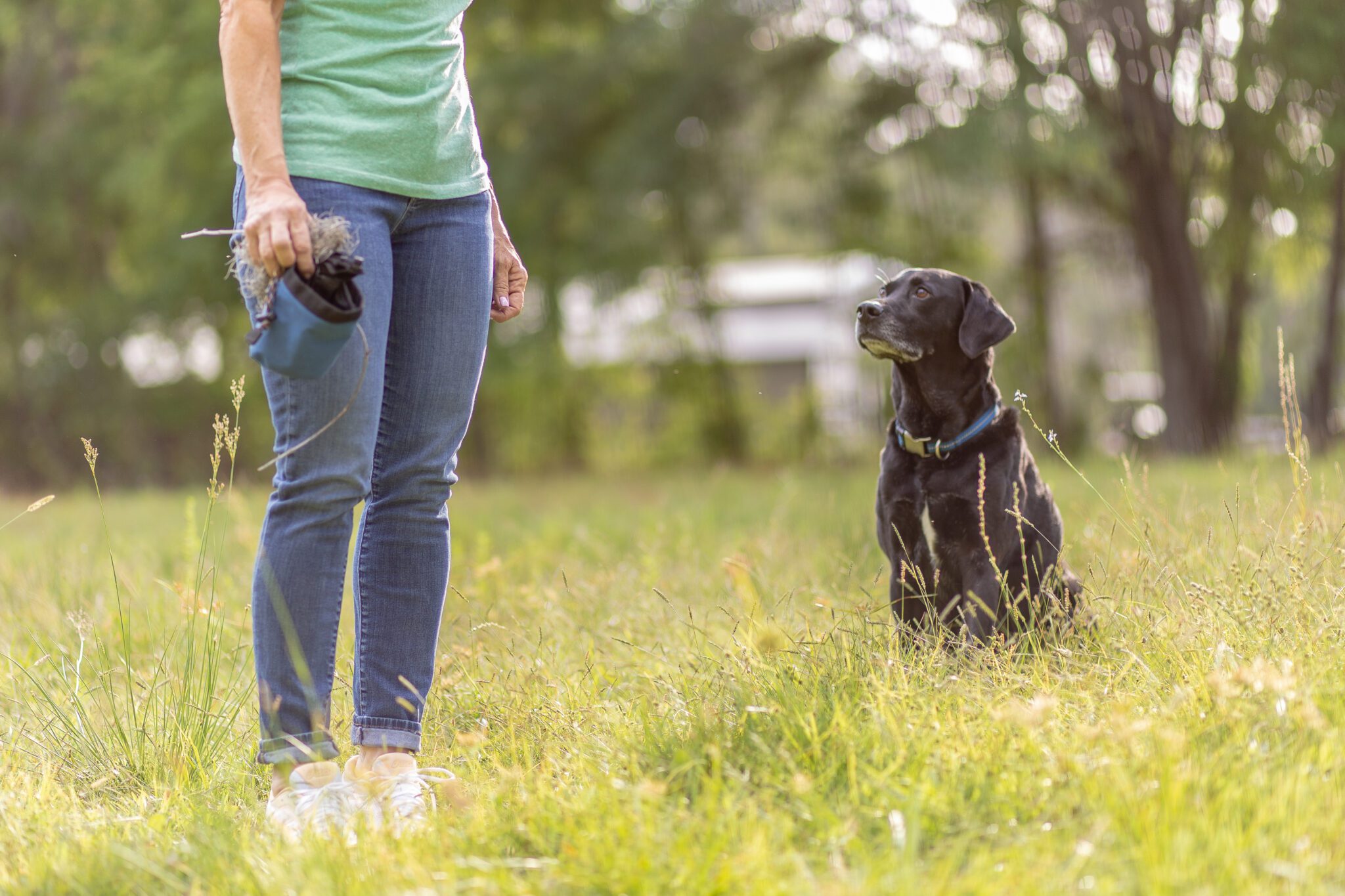
Zylkene is derived from the milk protein casein and contains naturally occurring calming compounds. This is one reason I love it so much. It’s a natural product that’s typically well tolerated because it comes from a food source. The active ingredient in Zylkene is hydrolyzed milk protein.
What if your cat or dog is allergic to milk? Typically, it’s the lactose in milk that pets are allergic to, so consuming Zylkene is unlikely to bother them.
The protein is dried and encapsulated so you can give it to your dog or cat. And unlike some treatments for anxiety, Zylkene capsules don’t cause drowsiness, so most dogs or cats will remain alert but calm. Your pet can still enjoy activities, trips, and celebrations without feeling sedated.
Zylkene helps balance reactions in situations that may trigger their anxiety and helps your pet maintain his or her normal and relaxed disposition.
Zylkene for Cat Anxiety
Does Zylkene work for cat anxiety? Yes! And it does so without making them drowsy. Other people who’ve used Zylkene even mentioned it worked so well that it seemed like they had a whole different cat in their hands!
If your cat exhibits signs of anxiety, it’ll be different from how a dog would show anxious feelings.
Cats may show anxious feelings by:
- Vocalizing excessively
- Hiding
- Withdrawing
- Acting aggressively
- Overgrooming
- Trying to escape
- Eliminating outside the litter box
I had a cat once who became very stressed when we moved to a new apartment. And we had brought in new cats to boot. He expressed his anxiety by marking everywhere, even on my oven!
And my cat, Olivia, would pee on my bathmat when she became stressed.
Cats are most definitely creatures of habit, and they very much like to have freedom in their domain. So bringing a new cat or any other animal into the family or even closing doors that are normally open can cause your cat to become very stressed.
For cases like these and many more, a calming supplement like Zylkene can be very effective, especially when given to your cats on a regular basis and preferably before the anxiety-inducing planned event begins.
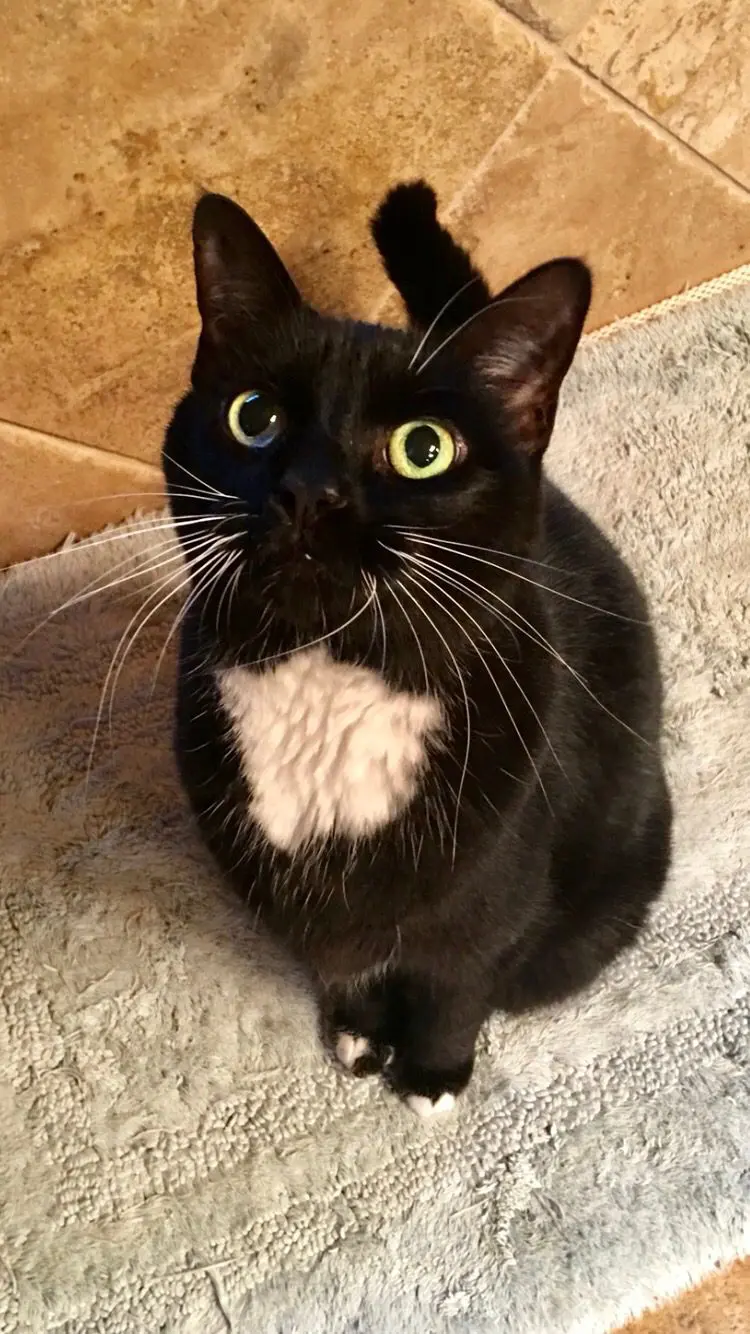
If your cat’s anxiety is extreme and Zylkene isn’t completely taking away the anxious behavior, try playing calming music. I personally love Zounz Music for Pets™ which is backed by research and composed to effectively reduce anxiety. Also, be sure to create a separate space in the home that’s dark and quiet. This layered approach may work best.
If the stressor is long-term, like a big move or adding a new family member (animal or human), it’s best to give your cat Zylkene daily for 30 days and then reevaluate your cat’s anxiety level.
If the stressor is short-term, like a veterinary visit, car rides, or a relative visiting, give your cat Zylkene a daily dose beginning two days before the event. Cats that are extremely stressed may need to begin using Zylkene 5-7 days before an anxiety-inducing event.
Zylkene for Dog Anxiety
Dogs display anxiety a little differently, but Zylkene also works to alleviate dog anxiety.
When anxious, dogs may:
- Hide
- Bark
- Drool
- Yawn
- Become clingy
- Pant
- Put their ears back
- Tremble
- Refuse to eat
- Pace
If your dog is feeling anxious over noises, separation, vet visits, or other stressors, Zylkene, given beforehand, can help calm them down.
For long-term stressors, like a big move, the advice is the same as for cats. Give your dog a daily dose of Zylkene for 30 days and then reevaluate your dog’s anxiety level.
For short-term stressors, like a vet visit or a fireworks event, give your dog a daily dose of Zylkene beginning two days before the event. Dogs that are extremely stressed may need to begin using this calming supplement 5–7 days before an anxiety-inducing event.
Pin me!
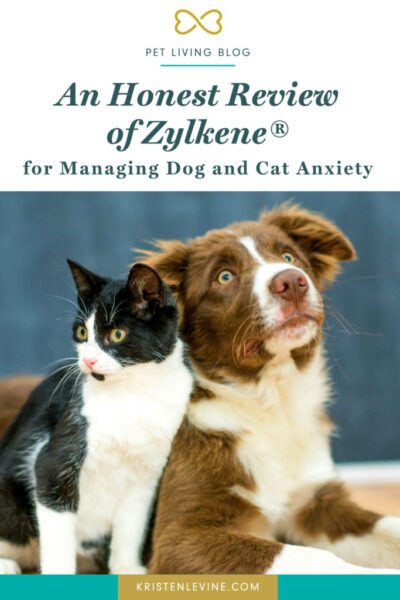
Is Zylkene Safe for Long-Term Use?
Zylkene is generally considered safe for long-term use. Remember, it’s a milk protein, which is a food source. So, much like the food we feed our dogs or cats every day, it’s unlikely they will become intolerant.
However, it’s always good to reevaluate your dog or cat’s anxiety level after using it for 30 days. It may be that your pet doesn’t need it anymore!
Does Zylkene Interact with Medications?
Because it’s essentially food, Zylkene isn’t known to interact with medications or other therapies. But if you’re still concerned about contraindications, your veterinarian can allay any fears you have.
What Are the Side Effects of Zylkene?
It’s unlikely your cat or dog will experience any side effects from this calming supplement. Mine have no trouble with it. But in rare cases, it can cause stomach upset or diarrhea. If this happens, it’s recommended to discontinue use, and you may choose to call your veterinarian.
Zylkene is eliminated from your pet’s system within 24 hours, so any side effects would be short-lived.
Even if your dog or cat overdoses on Zylkene, it’s unlikely to cause any more side effects than some gastrointestinal discomfort.
Bottom line: Zylkene is generally well tolerated and considered safe.
How Do You Administer Zylkene?
There are three purchase options for Zylkene. The weight of your pet will determine which prescription strength to administer.
Since Zylkene is often used primarily for situational anxiety, it’s most effective when you administer it well before the stress-inducing event, such as a grooming or veterinary visit.
Zylkene is safe for long-term use, but if your pet only needs occasional support, you can follow the dosing instructions and begin to give your pet his or her dose of Zylkene up to 7 days before the event.
Zylkene comes in a capsule, so one way to give your dog or cat Zylkene is to simply give them the capsule. Some pets have no problem eating the entire capsule.
But if your dog has difficulty with pills, you can open the capsule, add it to peanut butter and smear it on a licking mat like this one. Or you can open the capsule and pour the ingredients into their wet food or water.
Zylkene has no taste, so this is great for cats that are picky eaters. Simply sprinkle it on her food or water, and rest assured that she’ll get its calming benefits.
Other At-Home Pet Anxiety Treatments
If you’re dealing with an anxious pet, please know that there is much you can do to comfort your furry friend. Here are some effective things you can do at home to make your pet feel secure:
- Make sure your pet gets regular exercise.
- Play classical or instrumental music, such as Zoundz.
- Provide a safe, quiet space for your pet to self-soothe, such as a crate or box.
- Use calming coats or shirts.
Additionally, if you’re dealing with an anxious kitty, try these feline-specific cat anxiety remedies:
- Clean litter boxes more often.
- Stick to a routine.
- Try pheromone diffusers, such as this one.
Even after trying these at-home behavioral remedies, you might find that your pet is still showing signs of anxiety. The fact is, pet anxiety is a medical condition, and the most effective treatment could be a prescription medication. Of course, be sure to talk to your veterinarian before starting any new medicine for dog anxiety or cat anxiety.
Visiting a certified veterinary behaviorist who can determine the causes and triggers of your pet’s anxiety will also help in identifying the best course of treatment. Since prolonged fear and stress can have a significant impact on your pet’s quality of life, it’s vital to seek treatment as soon as possible for an anxious pet.

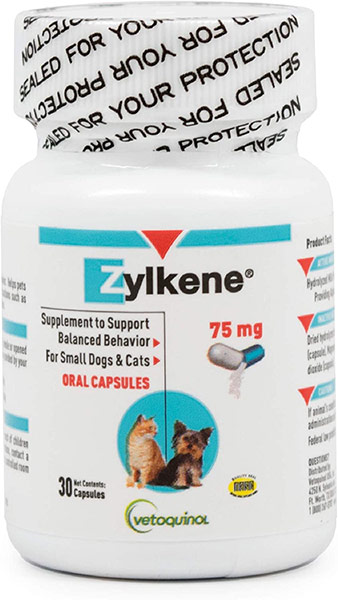

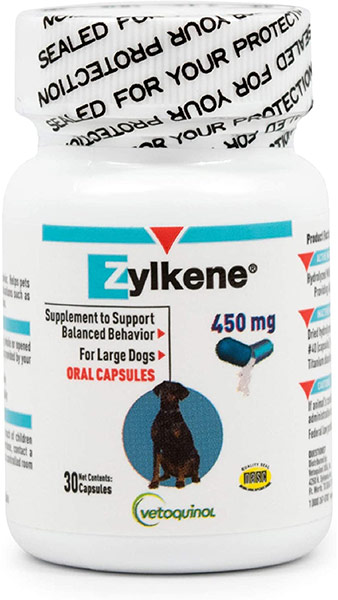
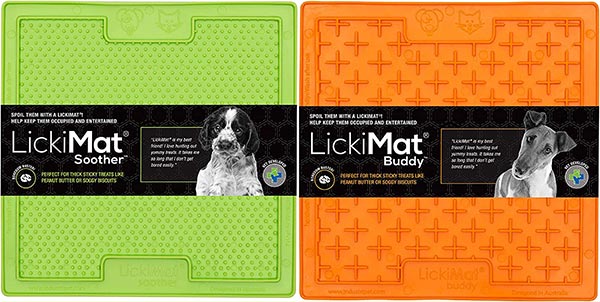



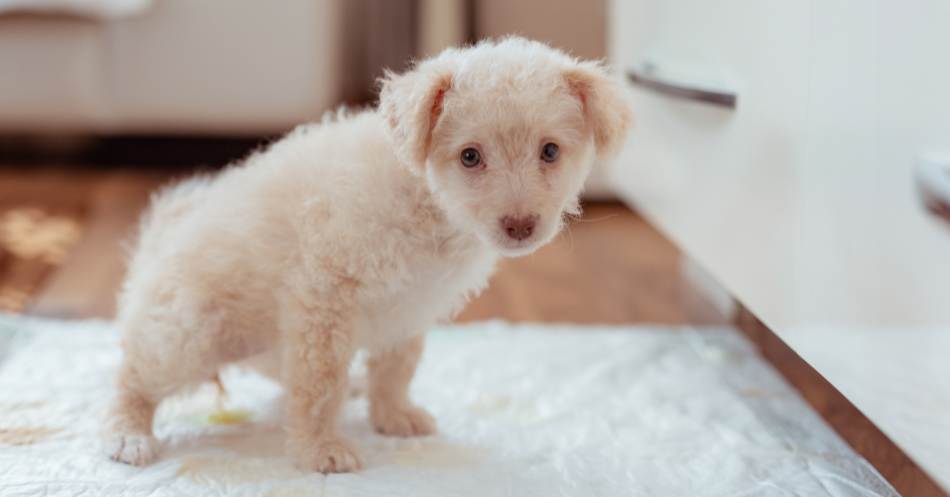


My cat has food allergies and is on Hill’s Prescription Diet z/d. Can she take Zylkene?
Hi Kathleen,
Zylkene contains a natural product derived from a protein found in milk, and works to support your cat when they are feeling stressed or vulnerable. … It is designed to be fed to your pet once a day with a meal or treat.
If your cat is allergic to milk, there may be an issue, but if not, it should be safe. Be sure to give it to her with her food.
I hope this is helpful!
Kristen
Hi,
I accidentally left our bottle of zylkene in the car for several days when it was fairly hot outside. Do you think it is still safe to use?
Hi Shannon,
I reached out to the folks at Zylkene about your dilemma and here’s what they said:
We do not have any evidence that there are any risks to the product, nor is there any reason to believe that efficacy would be reduced. If your reader is still concerned please have her reach out to me and we will send a replacement for free, we want to make sure all of our customers is comfortable with the safety of our products and satisfied with them. I understand her concern about giving her pet something she thinks is questionable, so we would be happy to give her a fresh product.
If you’d like to take them up on a fresh Zylkene product, contact Dan Greer! Here’s his email: daniel.geer@vetoquinol.com
Kristen
Hi,
My dog has a lot of stress around the car. He was a rescue and spent along time in a van to get to us.
We have managed to get him in and sitting on the back seat, but he dribbles the whole way and gets fidgety. We have tried a create in the boot, back seat, feeding him in the car, wearing him out before travel but nothing seems to work. We have also been to the vets and tried the collar, valerian and skullcap tablets, spray and wipes but has no affect. We feel like we are mean dog parents making him travel 🙁
Hello,
My dog receives Zylkene when I travel due to her anxiety. The night before we go on a road trip as well as the following morning, I sprinkle Zylkene over her food. She is relaxed but she is still her usual self with none of the anxiety. It has been a life-saver.
Charlene,
I am so glad you have found this to be helpful! Zylkene is great since it doesn’t change our pets personalities. That’s why I love it!
Kristen
My son accidentally stepped on one of my ragdoll cats and he squealed loudly , puffed up and the three other cats all reacted! It turned into mayhem. Since this has happened we separated him and the other three cats ( all are indoor cats) the female Ragdoll appears terrified of him now but she is showing signs of aggression, growling , spitting and high pitched scream. He got cornered the other evening and retaliated . I’ve now separated her from the rest but the moment she lays eyes on him, her ears go flat, pupils dilate, she growls and would def attack given the chance . I’m hoping to introduce them( scent swapping etc over a period of time . I’m heartbroken for them all. The other three cats tolerate each other. Do you think Zylkene would benefit her at all. One incident and all this mayhem has occurred. I’m
Truly worried ! Thank you in advance .
I have a problem with an existing 18 month old cat who’s very unhappy about the arrival of a kitten. This has been going on for 5 weeks now. Will giving this help the situation. I’ve had a calming collar and Feliway plug in on to no avail.
Hi Adele,
I am sorry to hear that your cat is unhappy about your new bundle of fur!
Cats are very territorial. So, it’s not surprising to hear that your older cat is unwelcoming of your new kitten. It can take months for them to get used to one another. Your older cat will want to show the kitten that he/she is in charge of your house. That will take time, and unfortunately there is no sure way to speed up that process.
Zylkene could help with anxiety, but this may not be an anxiety specific problem. I highly recommend this book for situations like this. It can really help you learn how your cats are communicating to one another so you can help them get used to one another.
I hope this helps! Keep me posted!
Kristen
My 9 year dog has issues coping with company at home and with me stopping to talk to other dog walkers on the sidewalk. She has a very loud barking fits. These are ad hoc situations so is it safe to give her Zylkene on a daily basis?
Hi Darla,
It is always best to check with your vet before adding anything longterm to your pet’s diet. I have used Zylkene with the supervision of my vet before, and it did well for us! I would talk to your vet before testing it out on her, so you can both monitor her behavior! Zylkene is considered safe as it is naturally derived from dehydrated milk. So, it is typically safe longterm.
Hope this helps!
Kristen
Hi. My cat has feline cystitis. It always occurs when something stresses her. She also picks up off me when I’m not well. Will this benefit her if taking regularly. We also have her 2 4 year old kitties. They get on well and at times play together. Lalita goes outside and sleeps inside at night. Since my husband and I have retired she likes being inside more.
Hi Jennifer,
Zylkene could be a great option for her! It is an all natural supplement so it is generally safe for longterm use. You should ask your vet about it before adding it to her diet, since she has cystitis.
Kristen
Hi!
I have just started my 18 month old dog on Zylkene for separation anxiety.
I’ll be giving him his daily dose (prescribed by the vet). Have you heard of dogs that learn they can be calm when you are away and eventually not need the medication any longer? thanks!!
That’s an excellent question! I interviewed Dr. Lisa Radosta, DVM on this topic and her reply was that most dogs do not fully recover from separation anxiety, but with the right treatment, symptoms can greatly diminish to the point where they’re hardly noticeable. You can see the full interview/blog post here.
Please let me know how it goes!
Hi,
I have a leash reactive Labrador. He barks and lunges at other dogs.
My vet recommended this product, he needs 2 of the 445mg tablets
When do I give him the tablets?
Can I give him 2 at the start of the day to help
Him feel calm throughout the day (hopefully he doesn’t feel like he needs to bark at everything walking past our house).
Or should I give this to him an hour before his walk?
Thank you in advance
Lavi, I’m sorry to hear that your pup is leash reactive. But I’m happy your veterinarian introduced you to Zylkene! I would suggest trying both methods to see which works best for your dog. Thankfully, you can safely use Zylkene capsules as needed just prior to stressful periods or daily for as long as your dog needs calming support. Best wishes!
Kristen